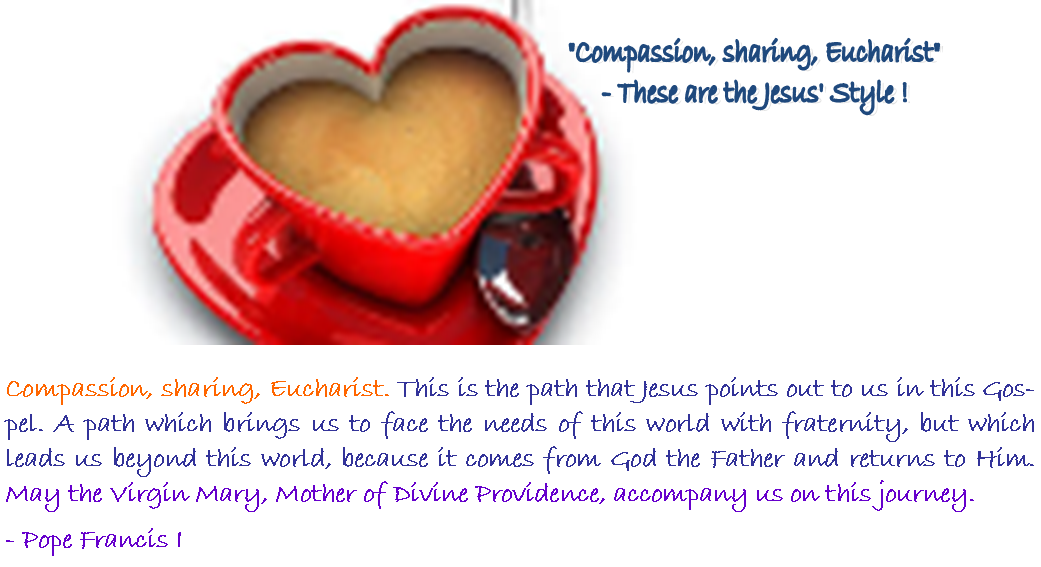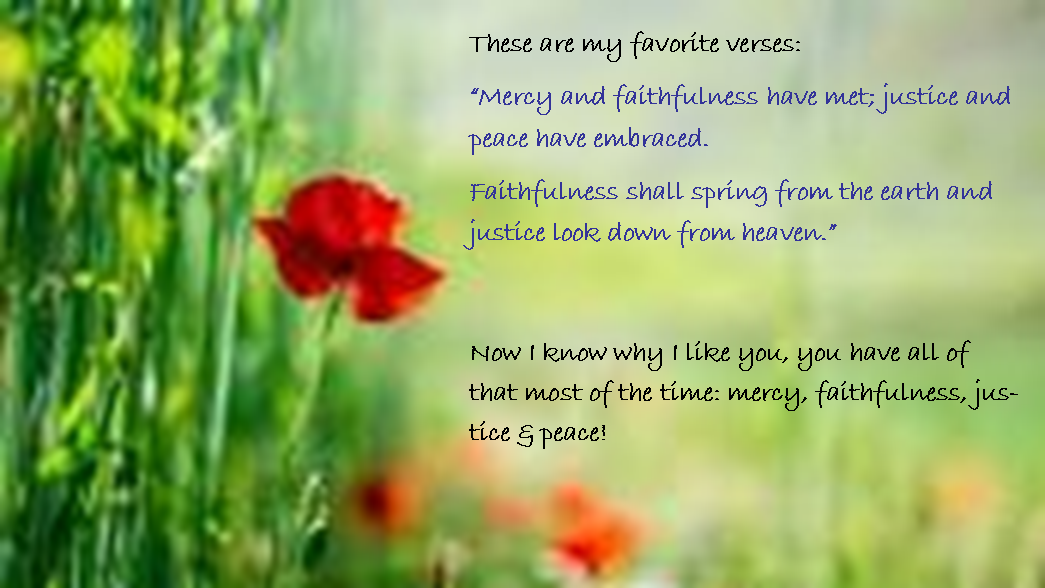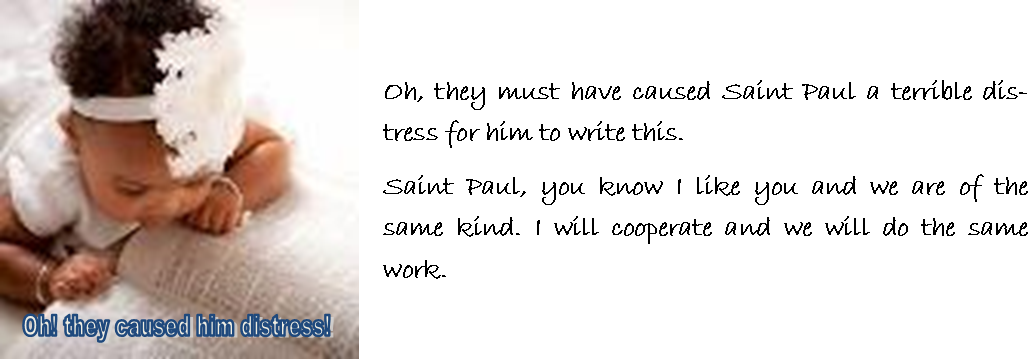|
224 |
|
After the Angelus:
I am pleased to greet all the English-speaking pilgrims and visitors present for this Angelus prayer. In today’s Gospel passage, we hear of the multiplication of loaves and fishes, which in a wonderful way prefigured the institution of the Eucharist. We pray that Christians, scattered like grain throughout the world, will be united in offering the one bread and the one cup, and so become one body, one spirit in Christ. May Almighty God bless you and your loved ones!
Lastly, I recall that the Peach Festival is taking place today at Castel Gandolfo. Every year I wish even greater success to this traditional initiative which involves the collaboration of the municipal administration, the parish and all the town’s citizens. I wish you all a good Sunday. Thank you, best wishes!
Acknowledgment: We thank the Vatican Publisher for allowing us to publish the Homilies of Pope Benedict XVI, so that they could be accessed by more people all over the world; as a source of God’s encouragements to all of us. |

|
POPE FRANCIS ANGELUS St. Peter's Square
Dear Brothers and Sisters Good morning,
This Sunday, the Gospel presents to us the miracle of the multiplication of loaves and fish (Matthew 14:13-21). Jesus performed it along the Lake of Galilee, in a deserted place where he had withdrawn with his disciples after learning of the death of John the Baptist. But many people followed them and joined them there; and upon seeing them, Jesus felt compassion and healed their sick until the evening. And seeing the late hour, the disciples became concerned and suggested that Jesus send the crowd away so they could go into the villages and buy food to eat. But Jesus calmly replied: “You give them something to eat” (Matthew 14:16); and he asked them to bring five loaves and two fish, blessed them, began to break them and give them to the disciples, who distributed them to the people. They all ate and were satisfied, and there were even leftovers! We can understand three messages from this event. The first is compassion. In facing the crowd who follows him and — so to speak — “won’t leave him alone”, Jesus does not react with irritation; he does not say: “These people are bothering me”. No, no. He reacts with a feeling of compassion, because he knows they are not seeking him out of curiosity but out of need. But attention: compassion — which Jesus feels — is not simply feeling pity; it’s more! It means to suffer with, in other words to empathize with the suffering of another, to the point of taking it upon oneself. Jesus is like this: he suffers together with us, he suffers with us, he suffers for us. And the sign of this compassion is the healing of countless people he performed. Jesus teaches us to place the needs of the poor before our own. Our needs, even if legitimate, are not as urgent as those of the poor, who lack the basic necessities of life. We often speak of the poor. But when we speak of the poor, do we sense that this man or that woman or those children lack the bare necessities of life? That they have no food, they have no clothing, they cannot afford medicine.... Also that the children do not have the means to attend school. Whereas our needs, although legitimate, are not as urgent as those of the poor who lack life’s basic necessities.
The second message is sharing. The first is compassion, which Jesus felt, and the second is sharing. It’s helpful to compare the reaction of the disciples with regard to the tired and hungry people, with that of Jesus. They are different. The disciples think it would be better to send them away so they can go and buy food. Jesus instead says: “you give them something to eat”. Two different reactions, which reflect two contrasting outlooks: the disciples reason with worldly logic, by which each person must think of himself; they reason as if to say: “Sort it out for yourselves”. Jesus reasons with God’s logic, which is that of sharing. How many times we turn away so as not to see our brothers in need! And this looking away is a polite way to say, with white gloves, “Sort it out for yourselves”. And this is not Jesus’ way: this is selfishness. Had he sent away the crowds, many people would have been left with nothing to eat. Instead those few loaves and fish, shared and blessed by God, were enough for everyone. And pay heed! It isn’t magic, it’s a “sign”: a sign that calls for faith in God, provident Father, who does not let us go without “our daily bread”, if we know how to share it as brothers.
Compassion, sharing. And the third message: the miracle of the loaves foreshadows the Eucharist. It is seen in the gesture of Jesus who, before breaking and distributing the loaves, “blessed” them (Matthew 14:19). It is the same gesture that Jesus was to make at the Last Supper, when he established the perpetual memorial of his Redeeming Sacrifice. In the Eucharist Jesus does not give just any bread, but the bread of eternal life, he gives Himself, offering Himself to the Father out of love for us. But we must go to the Eucharist with those sentiments of Jesus, which are compassion and the will to share. One who goes to the Eucharist without having compassion for the needy and without sharing, is not at ease with Jesus.
Compassion, sharing, Eucharist. This is the path that Jesus points out to us in this Gospel. A path which brings us to face the needs of this world with fraternity, but which leads us beyond this world, because it comes from God the Father and returns to Him. May the Virgin Mary, Mother of Divine Providence, accompany us on this journey.
---------------------------------------------------------------------
After the Angelus:
Dear brothers and sisters,
I address my greeting to all of you — brave, in the rain! — faithful of Rome and pilgrims from various countries.
I greet the relay participants from the Parish of Stella Maris of Lido di Latina, in collaboration with the Vatican Gendarme Corps and the Swiss Guard, and I bless the torch which will remain lit during the month of August as a sign of devotion to Our Lady.
I greet the young people from the Sacred Heart Parish in Pontedera, Diocese of Pisa, who came to Rome on foot along the Via Francigena.
I greet the AGESCI scouts who are here today, with a blessing for the thousands of Italian scouts on their way to the great national jamboree in San Rossore.
Remember: compassion, sharing, Eucharist.
I wish to all a happy Sunday. And please don’t forget to pray for me! Enjoy your lunch! Arrivederci!
Acknowledgment: We thank the Vatican Publisher for allowing us to publish the Homily of Pope Francis I, so that they could be accessed by more people all over the world; as a source of God’s encouragements to all of us. |

|
Nineteenth Sunday in Ordinary Time, First Reading: Extracted from the First Book of Kings: 1 Kings 19:9, 11-13 When Elijah reached Horeb, the mountain of the Lord, he went into the cave and spent the night in it. Then he was told, ‘Go out and stand on the mountain before the Lord.’ Then the Lord himself went by. There came a mighty wind, so strong it tore the mountains and shattered the rocks before the Lord. But the Lord was not in the wind. After the wind came an earthquake. But the Lord was not in the earthquake. After the earthquake came a fire. But the Lord was not in the fire. And after the fire there came the sound of a gentle breeze. And when Elijah heard this, he covered his face with his cloak and went out and stood at the entrance of the cave. |

|
Nineteenth Sunday in Ordinary Time, Responsorial: Psalm 84:9-14 Response: Let us see, O Lord, your mercy, and give us your saving help.
I will hear what the Lord God has to say, a voice that speaks of peace. His help is near for those who fear him and his glory will dwell in our land.
Mercy and faithfulness have met; justice and peace have embraced. Faithfulness shall spring from the earth and justice look down from heaven.
The Lord will make us prosper and our earth shall yield its fruit. Justice shall march before him and peace shall follow his steps. |

|
Nineteenth Sunday in Ordinary Time, Second Reading: Extracted from the letter of Saint Paul to the Romans 9:1-5 What I want to say now is no pretence; I say it in union with Christ – it is the truth – my conscience in union with the Holy Spirit assures me of it too. What I want to say is this: my sorrow is so great, my mental anguish so endless, I would willingly be condemned and be cut off from Christ if it could help my brothers of Israel, my own flesh and blood. They were adopted as sons, they were given the glory and the covenants; the Law and the ritual were drawn up for them, and the promises were made to them. They are descended from the patriarchs and from their flesh and blood came Christ who is above all, God for ever blessed! Amen.
Gospel Acclamation cf. Luke19:38, 2:14 Alleluia, alleluia! Blessings on the King who comes, in the name of the Lord! Peace in heaven and glory in the highest heavens! Alleluia! Or cf. Psalm 129:5 Alleluia, alleluia! My soul is waiting for the Lord, I count on his word. Alleluia! |